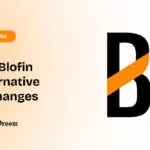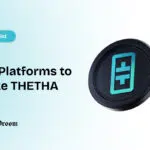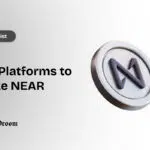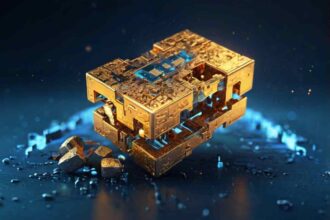Join us in the realm of decentralized finance, where ancient financial systems intersect with innovative blockchain technology. The core of this financial transformation revolves around DeFi tokens, which form the basis of a completely updated system. What, however, are DeFi tokens?
- How Do DeFi Tokens Work?
- How Are Defi Tokens Different From Defi Coins?
- Top DeFi Tokens
- Aave (AAVE)
- Algorand (ALGO)
- Bitcoin Cash (BCH)
- Cardano (ADA)
- Chainlink (LINK)
- Compound (COMP)
- Cosmos (ATOM)
- Dash (DASH)
- Dogecoin (DOGE)
- Where To Buy Defi Tokens
- The Role of DeFi Tokens on Protocol Governance
- Voting Rights
- Proposal Submission
- Protocol Upgrades
- Parameter Adjustments
- Community Engagement
- Decentralization
- Is it safe to Invest in DeFi tokens?
- Volatility
- Smart Contract Risks
- Market Risks
- Liquidity Risks
- Regulatory Risks
- Project Team and Development
- Security Measures
- Diversification
- What Are the Risks of Investing in DeFi Tokens?
- Smart Contract Vulnerabilities
- Liquidity Risks
- Impermanent Loss
- Rug Pulls and Exit Scams
- Interconnected Risks
- Oracle Risks
- Technology Risks
- Hacks and Exploits
- Operational Risks
- Conclusion
What are DeFi tokens? These are digital currencies that allow different monetary actions without involving big institutions such as banks in a broad, decentralized financial market. DeFi tokens serve as the digital passes that grant entrance to a self-governed domain of finance.
The recent development of DeFI shows a new approach to providing financial services. In comparison to the older centralized systems, DeFi relies on blockchain networks that use intelligent contracts as a mechanism to effectuate several financial functions.
How Do DeFi Tokens Work?
The tokens used in DeFi, which are usually referred to as DeFi tokens, act as a form of currency, driving the entire system into motion. These are tokens that utilize blockchain networks, especially the Ethereum network at their heart. Smart contracts, also known as self-verifying or self-executing contracts, are the tools that facilitate this “magic.”
They could be stablecoins, governance tokens representing shares in a company, or tokens linked to something that exists in the real world, like gold or oil. As a result, smart contracts allow these digital assets to carry out previously established operations without human intervention once certain prerequisites have been satisfied. For instance, smart contracts enable peer-to-peer lending and borrowing platforms without relying on conventional financial institutions.
Besides, the majority of these tokens are also important in managing protocols or governance within decentralized platforms. Governance token holders are involved in the decision-making process and shape the future of the project. This is a break from conventional financial systems, which entangle democratization in certain parts.
Here is a detailed guide that explains more about the role of smart contracts in the realm of DeFi.
In short, DeFi tokens use blockchain and smart contracting to establish a trustless and open-ended environment into which users can place their assets and engage in applications of decentralization while being part of governance like never before.
How Are Defi Tokens Different From Defi Coins?
These terms are used almost interchangeably; however, they have certain differences among which one should differentiate while discussing DeFi.
These include all kinds of digital assets designed for usage in the DeFi space, which are mostly deployed within a blockchain-based system such as Ethereum. The tokens would represent different types of financial instruments, like stablecoins, government tokens, and utility tokens. Their function of taking part in governance, earning rewards, and acting as collateral on the loans that are common in the wider DeFi protocols makes them unique and sets them apart from other DeFi assets or tokens.
To understand different types of tokens, you are recommended to read this article.
In contrast, “DeFi coins” is one of the terms used to describe individual cryptocurrencies tied specifically to DeFi projects. However, these coins can be applied in larger areas than just the DeFI area itself, being, for example, an instrument of payment or a means to store funds. Even though DeFi tokens are a part of DeFi coins, not every DeFi coin must serve as a token for DeFi decentralized applications.
Briefly, the term DeFi coins refers to all cryptocurrencies closely related to decentralized financial projects, regardless of their utility or functionality in those projects, whereas DeFi Tokens are a particular subset of digital assets that have an actual working purpose within some decentralized applications.
Top DeFi Tokens
Aave (AAVE)
The concept of ETHLend was established in 2017, and later, it became known as Aave in 2018. Kulechov is the founder of Aave. Blockchain technologists, financial advisors, and designers of decentralized systems comprise the team. Aave is a peer-to-peer lending platform based on Ethereum. Users can use smart contracts to provide and request different types of crypto-currencies. Holders of AAVA tokens will be able to play a governing role that will affect interest rates and collateral types.
Algorand (ALGO)
In 2017, Algorand was founded by award-winning cryptographer Silvio Micali. Algorand employs specialists in cryptography, computer science, and economics. Algorand is a scalable and fast-decentralized DApp platform. The proof-of-stake protocol allows for faster and safer transactions. Algo tokens are used for staking, voting, and trading within the ecosystem of Alogrand.
Bitcoin Cash (BCH)
In 2017, Bitcoin Cash appeared to be a product of a hard fork from the parent main BTC chain. Bitcoin Cash was developed by several developers and the community, which called for big blocks to promote scalability. It is based on a peer-to-peer electronic cash system with a main focus on cheap and quick transactions. This enhances the block-size limit to enable the processing of more transactions per block as compared to the initial Bitcoin.
Cardano (ADA)
It was set up in 2015 by Charles Hoskinson, who was one of the people behind the creation of Ethereum, and launched in 2017. Involved in the Cardano project is IOHK, a blockchain research and development company headed by Charles Hoskinson. The Cardano blockchain platform provides solutions to problems of scalability, development sustainability, and multi-facility interoperability. It uses a layered architecture and a special consensus algorithm called Ouroboros. Ardana is the currency that is traded throughout the Cardano chain, while ADA serves as a token and fuel for stakes.
Chainlink (LINK)
Chainlink was established in 2017 by Sergey Nazarov and Steve Ellis. Chainlink has a team of specialists in blockchain, smart contracts, and decentralized Oracle technologies. In short, chainlink is a platform for decentralized oracles that enables smart contracts to interact and connect with real-world information safely. The use of LINKs includes payment to node operators, collateral, or voting on decision-making, among others.
Compound (COMP)
In early 2017, Roderick Leshner created the compound. The compound has experts in accounting, software developers, and engineers who specialize in blockchain. Compound is a decentralized lending platform built on Ethereum. The interest rate varies depending on an algorithm that computes it concerning the supply of a certain cryptocurrency and the need of the borrower for it. Comp tokens give ownership powers to holders, including participation in voting on governance decisions.
Cosmos (ATOM)
The development of Cosmos began much earlier, at some point before 2019, when it went live. Inceptors of Cosmos were Jae Kwon, Ethan Buchman, etc. Jae Kown is a developer of Tendermint, which is the core technology behind Cosmos. It refers to the chain of various linked blockchains intended for facilitating communication among multiple blockchain networks, which is called a Cosmos. COSMOS HUB operates a native cryptocurrency called ATOM, which offers participants various forms of staking, governance, and security services.
Dash (DASH)
In 2014, a cryptocurrency called Dash was started under the names of XCoin and then Darkcoin before being changed. Dash is a project that originated from the ideas of Evan Duffield and was then further developed by a team of developers. It acts as a dashcoin, which is a privacy coin dedicated to quick and affordable transactions. Two-tier is a network it uses consisting of master nodes and miners. For example, master nodes work in addition to performing a role with InstantSend and PrivateSend, and DASH is used as the indigenous crypto-currency with which transactions take place and governance of the whole system is done.
Dogecoin (DOGE)
Jackson Palmer and Billy Markus unveiled Dogecoin in 2013. Although it was initially intended for use strictly as a joke, the development of the coin is still being conducted in modern times by a large group of adherents of the idea. Dogecoin is an open-source, peer-to-peer digital currency that was inspired by the Doge internet meme. Originally, it was supposed to be just a funny substitute for Bitcoin dedicated to tipping and social networks. The active and vibrant community around DOGE makes it popular for diverse transactions.
Where To Buy Defi Tokens
Do not get fooled, as there are no such things as tokens that one can buy solely on DeFi protocols. Major ones in the sector of DeFi are listed on most centralized cryptocurrency exchanges, like Coinbase and Binance. They are also tradeable and investable, like the other forms of this currency.
To engage in protocol governance, ensure that you have the tokens stored in a DeFi wallet, which must then be linked with the governance platform for the specific protocol, like Snapshot. It is important to stress that the process of governance does not feature gas charges.
The Role of DeFi Tokens on Protocol Governance
The essence of the DeFi tokens is that they help govern the protocols found on the platforms for decentralized finance. The governance aspect is concerned with the various decision-making processes involved in developing, updating, and generally shaping the future course of decentralization protocols.
Voting Rights
People who hold DeFi tokens, for example, usually have their votes in proportion to the number of tokens they possess. Translation: Hence, the greater the number of tokens held by an individual, the stronger their voice is in all decision-making procedures. People holding tokens have the right to vote for various initiatives ranging from a minor adjustment of the interest rate to major system-wide updates.
Proposal Submission
The protocol is not only token-owned but rather token-governed, meaning that token holders are allowed to make proposals regarding suggested changes and modifications. This facilitates community participation in governance processes, thereby promoting democracy and inclusiveness.
Protocol Upgrades
The decentralized protocols have never been static; they change accordingly with the market conditions that make them fit for use. The users are empowered to vote for and effect changes on such protocols that make them remain current, secure, and competitive through DeFi tokens.
Parameter Adjustments
Several factors in a decentralized finance system influence functionality, including but not limited to interest rates, collateral ratios, and liquidity pool allocations. Token holders usually have the power to suggest amendments for improved running of this system in the best way possible.
Community Engagement
Therefore, the participation of the community in governance through DeFi tokens. This encourages token holders to be active in deliberations, debates, and polls shaping the protocol’s future. Active participation ensures there is ownership as well as responsibility for it within each member of the community.
To learn more about communities in DeFi, read this guideline.
Decentralization
This governance structure provides for making different decisions by various groups of stakeholders, not only centralized companies. It adheres to the essential elements of blockchain.
To illustrate, the DeFi token constitutes a governance engine through which the whole community decides where to take the next step in the direction of decentralized finance. An integrative part of the decentralized ethos would include an inclusive and participatory approach that supports its transparency in fair practice, ensuring that these platforms are for their users.
Is it safe to Invest in DeFi tokens?
As with all investments, this one comes with its fair share of risks to consider. Here are some factors to keep in mind when assessing the safety of investing in DeFi tokens:
Volatility
Just as with most other cryptos, investing in some of the popular DeFi tokens can be very risky. Such fluctuations in prices may be rapid and unpredictable. This volatility offers great potential in that it can be highly profitable, but at the same time, it exposes one to the danger of major losses.
Smart Contract Risks
Smart contracts underpin the automation functions of the current DeFi platforms. Nonetheless, flaws or defects could cause break-ins and economic damage to smart contracts. If you want your investment to be successful, you must perform proper checks and balances on the given project’s smart contracts.
Market Risks
Market dynamics, regulatory changes, and public attitudes toward the crypto sector shape DeFi projects. The value and success of DeFi tokens as well as any other crypto assets may change owing to changes in market conditions as well as any other crypto assets.
Liquidity Risks
Small or new projects might encounter difficulties concerning the available capital to trade for some of these DeFi tokens. Slippage occurs when a trader is unable to transact their desired amount as liquidity declines, leading to high spreads.
Regulatory Risks
Uncertainty in regulatory environments and shifts in legal landscaping influence the functionality of DeFi projects. Keep abreast of regulatory changes in jurisdictions that may affect your proposed undertakings.
Project Team and Development
Evaluate the competence and authenticity of the project developers. Teamwork entails having a strong and transparent team that can steer changes and contribute to the long-term success of the project.
Security Measures
Review the security processes involved in the DeFi project. Such projects should have strong security measures, frequent auditing, and a prior record of promptly tackling issues associated with them.
Diversification
Do not invest all your cash in one DeFi token or project. If the firm diversifies its efforts across several platforms, it can reduce failures arising from particular systems.
Finally, buying DeFi tokens may provide an opportunity for growth, but one should be well-informed about the risks involved. Invest only what you can afford to lose, and maybe consult a financial advisor.
What Are the Risks of Investing in DeFi Tokens?
The investment in Defi tokens is associated with various dangers that should be considered beforehand. Here are some common risks associated with DeFi token investments:
Smart Contract Vulnerabilities
There are some weak points of DeFi platforms as they are based on smart contracts; thus, errors or holes within these contracts could result in breaking, hacking, and losses.
Liquidity Risks
This raises a question about the risk involved with some DeFi tokens, especially for small and new systems. Slippage may occur due to low liquidity since it may be hard to buy or sell tokens at the right prices.
Impermanent Loss
This implies that an investor may incur what is known as an impermanent loss when offering liquidity on a decentralized exchange.
Rug Pulls and Exit Scams
This decentralization nature makes many DeFi projects necessary to prove team or project legitimacy. Also, some projects engage in “rug pulls” or exit scams, whereby developers disappear with the funds without delivering any services.
Interconnected Risks
Interoperation is facilitated by composability in most DeFi projects, thus creating interdependencies between different platforms. It implies that one project’s failure or vulnerability can cause risk multiplication for other projects.
Oracle Risks
Most DeFi apps depend on Oracle for actual data in smart contracts. The manipulation of data provided by such oracles may result in the loss of finances and an interruption in DeFi activities.
Technology Risks
However, one needs to be abreast of the fast-developing DeFi environment because it will undergo many quick technological modifications. Users may also encounter problems such as compatibility issues and the need to migrate to new platforms with the advent of upgrades or changes in technology.
Hacks and Exploits
Hackers target DeFi projects through exploits. There have been high-profile cases of security breaches in the past, leading to losses of investment.
Operational Risks
Governance issues, dispute resolution methods, and internal conflicts in a community can destabilize or reduce efficiency for some DeFi protocols.
These risks need to be addressed by extensive research before investing, monitoring of the developments in a project, diversification, and investment within one’s means. Furthermore, staying updated on changes in the marketplace and adopting conservative strategies will ensure a safer route to security in the domain.
Conclusion
As a final remark, it can be said that DeFi tokens are on the front lines of a transformed financial world driven by decentralization, transparency, and community government. The digital assets that run on blockchain networks via smart contracts allow the users to participate in different scenarios of the decentralized finance system, from giving a loan to the borrower and taking part in the liquidity provider mechanism to participating in self-government protocols.
The road toward DeFi tokenization is full of ups and downs. Volatility in seas of investors, smart contract vulnerability, and changing regulation in the blockchain environment. Nevertheless, these are exactly the problems that make the notion of careful deliberation in connection with due diligence even more important.
The innovative power of the decentralized finance market is in its early stages as it continues to develop. A decentralized financial market provides opportunities for innovation, financial inclusion, and community. The story of DeFi tokens is yet to end, but its ability to redefine conventional finance toward inclusive and affordable economics is clearer all the time. In the ever-changing landscape of decentralized finance, one thing is certain: the tale of DeFi tokens is not complete yet.




















